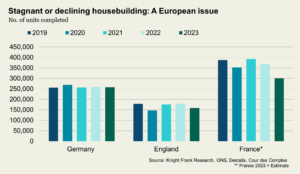The housebuilding sector is a critical issue for governments in advanced economies, facing challenges such as cost-of-living crises, escalating build costs, and labor shortages. This article examines the current situation in the UK, France, and Portugal, highlighting key challenges and initiatives.
UK: Prioritizing Construction
The new UK Labour government, led by Chancellor Rachel Reeves, has swiftly prioritized “getting Britain building again.” This ambitious plan aims to meet housing needs, an area where the country has often fallen short.
Challenges:
- High construction costs
- Bureaucratic hurdles
- Labor shortages
Europe: A Shared Concern
The UK is not alone. Many European countries have seen a decline in construction post-pandemic. According to the IFO Institute in Munich, 13% of construction companies in Germany were forced to cancel projects due to economic constraints.
Pressures:
- Rising demand from aging populations and immigration
- Increased construction costs and debt levels
France: A Complex Political Landscape
In France, following recent elections, a delicate balance among left, right, and centrist parties influences economic policies and the housing market. The Popular Front, which has the most seats, proposes ambitious fiscal reforms, but the lack of a clear majority complicates implementation.
Proposed Reforms:
- Reinstating a wealth tax
- High marginal tax rates
- Inheritance tax reforms
Portugal: Fiscal Attractiveness
The Portuguese government is introducing an attractive tax regime to lure skilled professionals. The plan includes a flat 20% income tax rate for residents to stimulate the economy and reduce the deficit.
Key Measures:
- Reducing corporate tax from 21% to 15% by 2027
- Mandatory 15% minimum tax for multinationals
Conclusion
The housing situation in Europe is complex and requires innovative solutions to overcome current challenges. Initiatives by various countries show a willingness to adapt to an ever-changing economic reality.
The policies implemented today will shape the housing landscape of tomorrow, making it essential for governments to collaborate with industry stakeholders to ensure a sustainable future.


